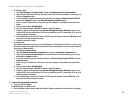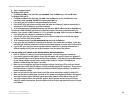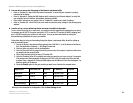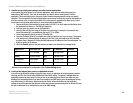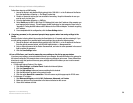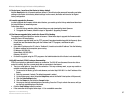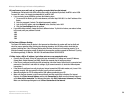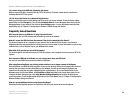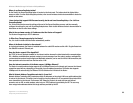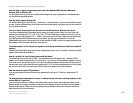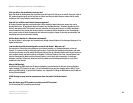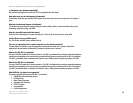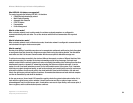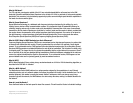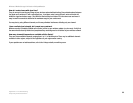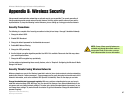
60
Appendix A: Troubleshooting
Frequently Asked Questions
Wireless-G Media Storage Link Router with SpeedBooster
Where is my SecureEasySetup button?
On the Router, the SecureEasySetup button is located on the front panel. The button should be lighted either
orange or white. For other SecureEasySetup devices, refer to each wireless device's documentation to locate the
button on that device.
I have devices that support WPA-Personal security, but do not have SecureEasySetup. Can I still use
SecureEasySetup?
Yes. Print out the wireless security settings at the end of the SecureEasySetup process, and then manually
configure the settings for your non-SecureEasySetup devices. Refer to each wireless device’s documentation for
instructions on how to enter these settings.
What is the maximum number of IP addresses that the Router will support?
The Router will support up to 253 IP addresses.
Is IPSec Pass-Through supported by the Router?
Yes, it is a built-in feature that the Router automatically enables.
Where is the Router installed on the network?
In a typical environment, the Router is installed between the cable/DSL modem and the LAN. Plug the Router into
the cable/DSL modem’s Ethernet port.
Does the Router support IPX or AppleTalk?
No. TCP/IP is the only protocol standard for the Internet and has become the global standard for communications.
IPX, a NetWare communications protocol used only to route messages from one node to another, and AppleTalk,
a communications protocol used on Apple and Macintosh networks, can be used for LAN to LAN connections, but
those protocols cannot connect from the Internet to a LAN.
Does the Internet connection of the Router support 100Mbps Ethernet?
The Router’s current hardware design supports up to 100Mbps Ethernet on its Internet port; however, the Internet
connection speed will vary depending on the speed of your broadband connection. The Router also supports
100Mbps over the auto-sensing Fast Ethernet 10/100 switch on the LAN side of the Router.
What is Network Address Translation and what is it used for?
Network Address Translation (NAT) translates multiple IP addresses on the private LAN to one public address that
is sent out to the Internet. This adds a level of security since the address of a PC connected to the private LAN is
never transmitted on the Internet. Furthermore, NAT allows the Router to be used with low cost Internet
accounts, such as DSL or cable modems, when only one TCP/IP address is provided by the ISP. The user may
have many private addresses behind this single address provided by the ISP.



